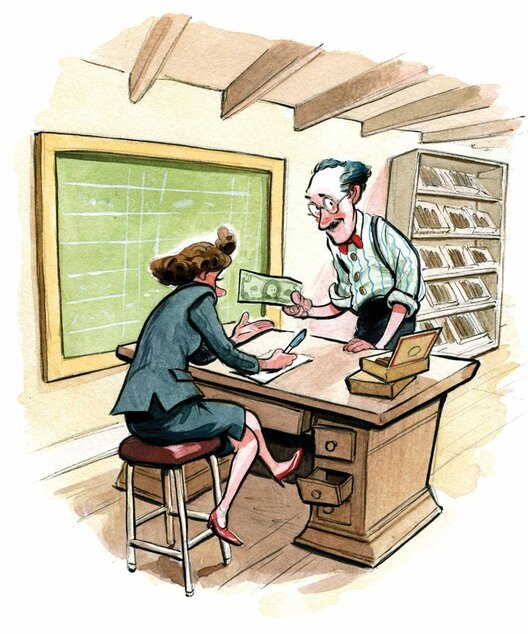
Fannie Fishman. She was smart and feisty, and she wore business suits. Reporters were irritated by the inability of the police to capture “the only female bookmaker in the area.”
She was also related to SLM‘s staff author by marriage. Mal Cooperman, her father-in-law, was a law-abiding type growing up. However, as a child in the 1940s, he worked in the cinema palace next to his great-aunt’s St. Charles Cigar Store. He also acted as her watchman. He saw “a new tec” in the lobby near the St. Charles exit.
Mal casually asked, “Whatcha doin’?”
“Oh, we are watching the bookie joint at the corner. “That’s Fannie Fishman.” (She had divorced Louis Fishman by then, who owned Fairmount’s racehorses. “We have never been able to capture her.”
Mal walked across the lobby and went into his boss’s office to call Aunt Fannie. He said, “I’m on the street working today.”
“Oh, good. She said, “Come over for a small lunch.”
“No, a cop is watching the joint and he’s counting heads while he waits for a bunch to arrive.”
Fannie grumbled, “Son of the bitch.”
Mal told his daughter-in-law that there were double-glazed doors that she kept locked and that she had to buzz people in. She also had a large board she used with wet chalk. It was so dark that you couldn’t see the top. She used to have me tote the odds.”
Mal stood in the lobby and watched for 45 minutes as the detective stared at him before moving up to him. “How’s it going?”
The detective replied, “I don’t understand it.” “All of the sudden, there’s no one there. Nobody’s goin’ in, nobody’s comin’ out.”
Mal said Aunt Fannie laughed for quite a while.
Her singular reputation was well-earned. The St. The St. Louis Post-Dispatch reported in 1931 that police raided 11 handbook stores and arrested “16 men” and “Miss Fannie Fishman”. It was her fifth arrest but it never stood.
Police had discovered the secret basement door that allowed escapes to the next-door business by September 1941. Fannie was arrested after they went downstairs. Although she wasn’t indicted, she was fined $50 by a tired police judge. He pointed out that Fannie had “been here before.”
She was arrested at most four times between 1946 and 1948. She was arrested at least four times between 1946 and 1948.
She was summoned to testify in Terre Haute’s federal gambling case. Fannie arrived “in a yellow hat, full polka dots dress” and was accompanied by Morris Shenker (later chief counsel to Jimmy Hoffa).
Fannie, as she emerged from the courthouse said nothing to reporters, except that she was now retired. They asked, grinning, “From where?” She replied, “You can say that I’m a home wife.”
Her cigar store was again raided the next winter. Police found three dice sets in cups and two loaded revolvers. Why wasn’t she close? the police captain lamented.
She reportedly said to him that she had been there for a while and “if things change around here, I might be here and you could be gone.”
A minister defending gambling rights heard this response and exclaimed, “Is a city or state so great that one person can defy the law?” The Post headlined in November 1949: “Policemen outwit woman bookie, seize evidence.” Before she could dispose of the betting tabs, officers had taken them from her hands. She answered that she would stop placing bets “now” when they asked.
What headline was the headline one month later? “Fannie Fishman Released; Grand Jury Didn’t Indict Her.”
The “For Rent” sign was not displayed in the shop’s window until 1952 when a new federal excise tax law took effect. Fannie wasn’t going to give 10 percent of her gambling income over to the government.
Her sister Mabel understood. Mabel Thorpe was the owner of the Blackstone Hotel on Washington Avenue where she entertained guests with female impersonators (today called drag queens). Mabel, who was defending her right to a liquor license, insisted that Mabel managed “a beautiful place” and that “any city worker can tell you about my activities because they’ve all been there.”
“Following the revocation of her license,” the Post stated, “Miss Thorpe’s establishment continued to flourish.”
Jerry Berger, a gossip columnist, named 10 St. Louis “Damon Runyon” characters in 1964. Fanny was the second and Mabel was the third.


